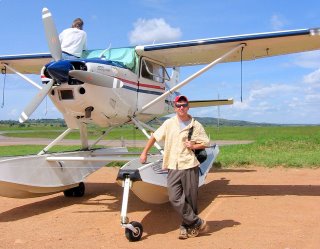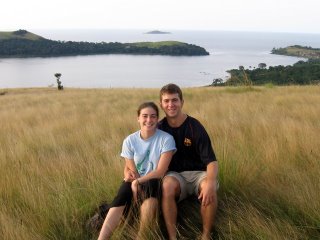An article written by Toya Richards Hill, appearing in the June/July 2006 issue of Presbyterians Today Magazine.Learning how it feels to be a minority: Evans McGowan, who stands out among the people he works with in Kenya
Evans McGowan dreamed of living for an extended time outside the United States. And he believed a faith-based endeavor would be the backdrop for this experience.
Through the Presbyterian Church (U.S.A.) Young Adult Volunteer program he found the "perfect fit" for his dream: a one-year mission adventure in Kenya.
Working with Church World Service (CWS)—a U.S.-based relief and development agency in partnership with community-based organizations around the world—McGowan chronicles various programs and initiatives in the East African country. The goal: to build awareness and generate more donor funds.
Through a mix of traveling in the field to see projects up close and personal, and listening to updates from CWS workers and various grassroots organizations, McGowan gathers stories for a Web site and newsletters detailing how people's lives are being changed. His base is Nairobi.
"It really is a miracle job," says McGowan, 23, who calls Wilmington, Del., home and whose mother is a pastor at Westminster Presbyterian Church there. "What's wonderful is to see development work in practice, as opposed to just knowing of it in theory," he says.
Since arriving in Kenya last August, McGowan has witnessed everything from dairy goat farming and beekeeping to water system development and micro-financing efforts. And the 2005 Davidson (N.C.) College political science graduate has made a connection with the people of Kenya.
McGowan's time there also has resulted in personal growth and introspection. The experience of being away from family and friends has brought him closer to God.
There came a time when "I just suddenly realized I didn't have any of my close friends," he says. "That feeling of loneliness just hit."
Yet that same feeling of separation has been crucial to his Christian walk, which includes practices such as daily devotions and journaling. "Really getting in touch with God has been very key to me," McGowan says.
Being a minority—a white male in a majority black African world—also has been "challenging," he says. "It's really opened my eyes" to the feelings of segregation and discrimination."
"It's been humbling for me, and that's been a good thing," he says.
Ultimately, McGowan is hoping the overall experience of this year will help shape his future. He returns to the United States in August, after which he plans to take a year off before entering San Francisco Theological Seminary's Master of Divinity program.
"I really feel called to lead people to combine community action with their faith," says McGowan, "so they can put their faith in action."
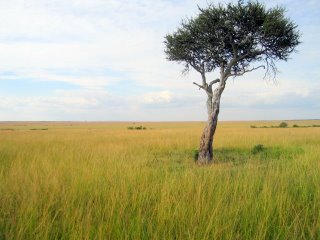




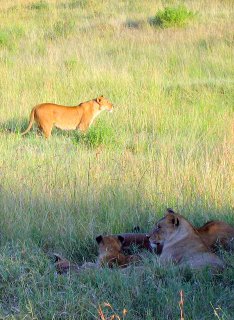 This week the other YAVs and I had our final retreat at Keekoroch Lodge in the Masai Mara. It was a relaxing time, as we caught up on our activities, read a few books, welcomed Phyllis back to Kenya after a four-month "missionary tour," and enjoyed the sights and sounds of the Mara wildlife.
This week the other YAVs and I had our final retreat at Keekoroch Lodge in the Masai Mara. It was a relaxing time, as we caught up on our activities, read a few books, welcomed Phyllis back to Kenya after a four-month "missionary tour," and enjoyed the sights and sounds of the Mara wildlife. 






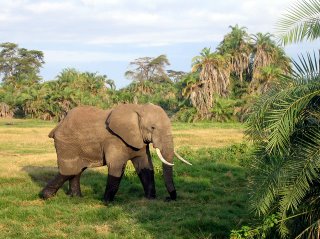

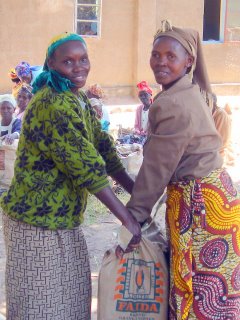 Mr. Kisu, an elder in the Kenya Evangelical Lutheran Church (KELC), beams a smile as he calls out another name. He is not the only one smiling. A woman rises, presenting her ID before stepping over to the stacks of flour packets. Three women, chosen by the community to distribute the relief food, hand the woman her family’s share.
Mr. Kisu, an elder in the Kenya Evangelical Lutheran Church (KELC), beams a smile as he calls out another name. He is not the only one smiling. A woman rises, presenting her ID before stepping over to the stacks of flour packets. Three women, chosen by the community to distribute the relief food, hand the woman her family’s share. Pastor Chambi and two church committee members observe the distribution from a distance. With weekly offerings of US$15 or less, he cannot help many people who seek assistance but today is different. Seeing these food donations makes his robust arm movements more expansive, as he emphasizes, “It doesn’t help to just give them something, but to teach them how to use it.”
Pastor Chambi and two church committee members observe the distribution from a distance. With weekly offerings of US$15 or less, he cannot help many people who seek assistance but today is different. Seeing these food donations makes his robust arm movements more expansive, as he emphasizes, “It doesn’t help to just give them something, but to teach them how to use it.” He watches as another single mother passes, stooping under her received unga (flour). A member of Salvation Army, Sarah Nzuki has five children and walked 3 km today to receive her rations. While the food is only enough for one week, she is happy and extremely grateful to have more time to spend on productive activities such as growing and selling mangoes.
He watches as another single mother passes, stooping under her received unga (flour). A member of Salvation Army, Sarah Nzuki has five children and walked 3 km today to receive her rations. While the food is only enough for one week, she is happy and extremely grateful to have more time to spend on productive activities such as growing and selling mangoes.


